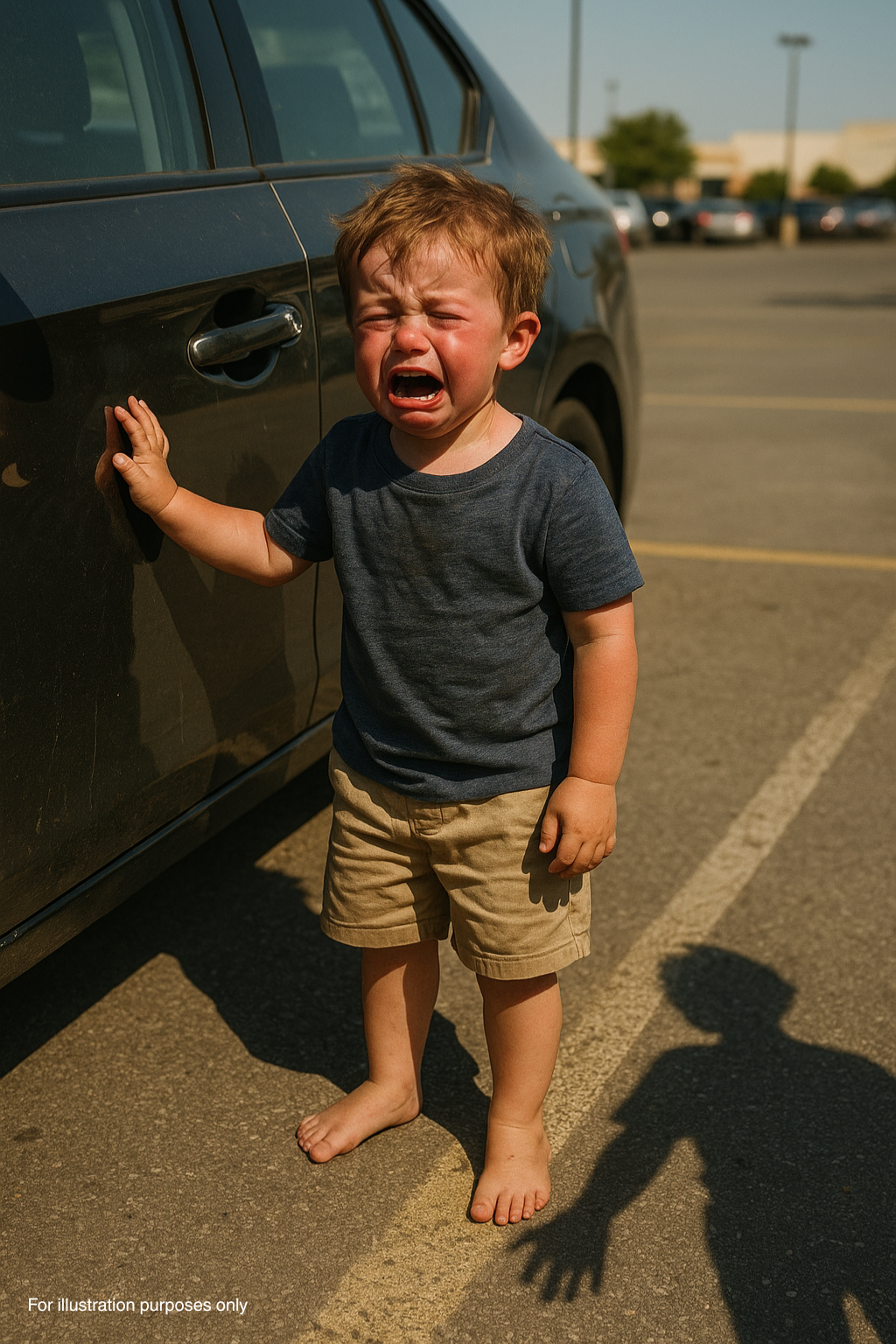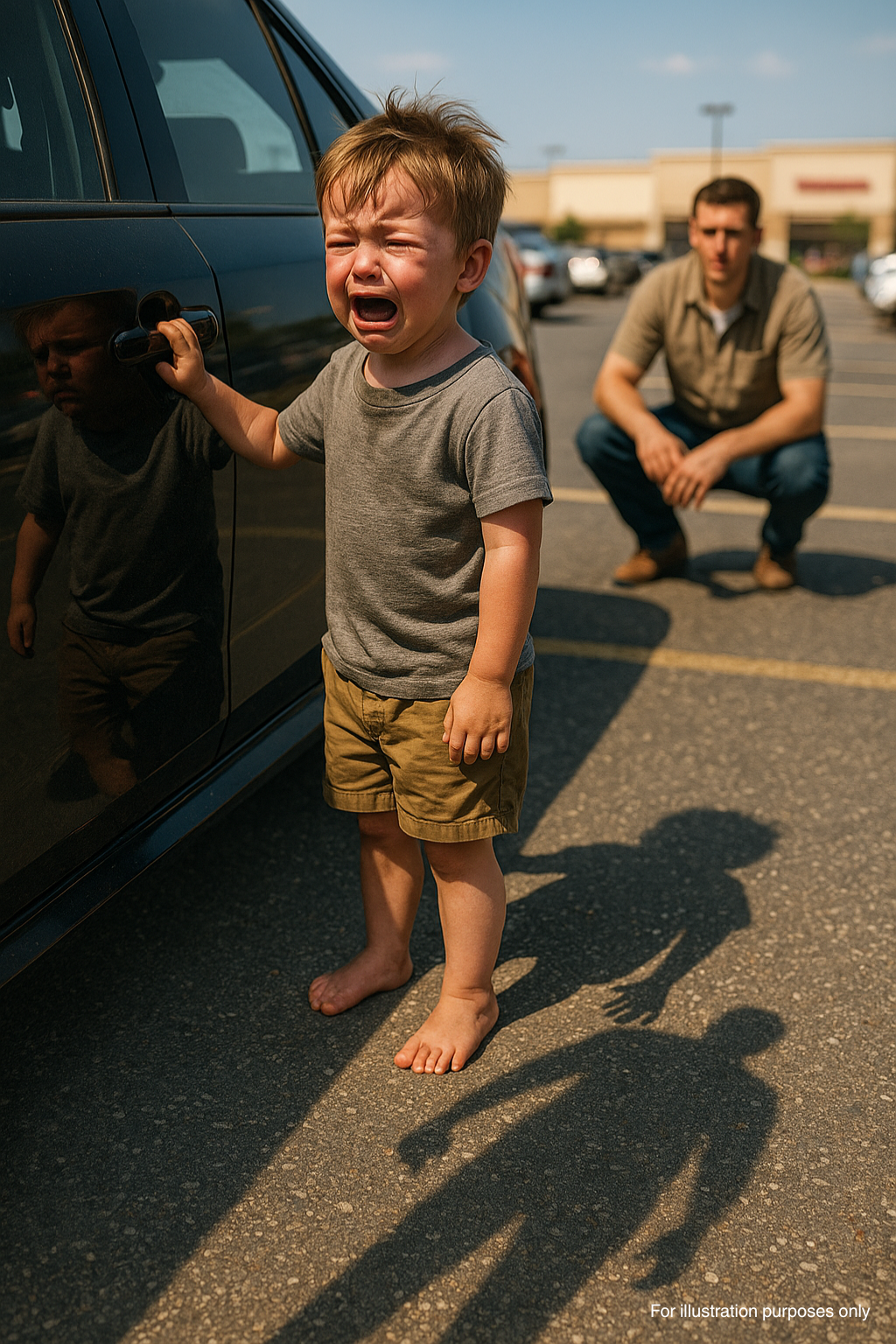The first time I saw him, he looked like something torn from another life—small, barefoot, and trembling so hard his bones might’ve cracked. He stood beside a black sedan, tiny fists clutching the door handle like he believed it might open if he begged hard enough.
No shoes. No parent. No voice in the wind calling his name.
The sun had scorched the back of his neck a soft, painful red. His yellow T-shirt clung to his back with sweat. I scanned the parking lot—dead silent, empty save for a few idling cars and the hum of distant traffic.
I knelt down, heart tightening. “Hey there, where’s your mom or dad?”
He hiccupped through his sobs. “I wanna go back in.”
“In where?” I asked gently.
His finger rose, shaky and certain, pointing toward the locked sedan. “The movie. I wanna go back in the movie.”
I blinked. “You were at the theater?”
He nodded like the answer should be obvious.
I tried the car door—locked. Nothing inside but dust. No booster seat. No crumbs. No crayons or juice boxes. It was like no child had ever sat in it.
Scooping him into my arms, I made for the movie theater down the block, asking questions he answered in half-whispers.
“Who brought you here?”

“My other dad,” he said.
Something in my chest went still. “Your… other dad?”
“Yeah,” he said. “The one who doesn’t talk with his mouth.”
Before I could make sense of that, a mall security officer coasted up beside us in a golf cart. I told him everything. We took the boy—he said his name was Eli or Elias—through the mall, asking everyone if they recognized him.
Each answer was a mirror: “Sorry. Not mine.”
Eventually, security pulled footage from the lot.
What we saw shattered logic.
There was no one dropping Eli off. No one walking him in.
One frame—empty parking space.
Next frame—Eli, standing alone beside the black sedan.
But the shadow… the shadow wasn’t alone.
“Look at that,” the guard murmured.
The boy’s shadow was gripping a hand.
An invisible companion.
I replayed it again and again. The air in the security office turned thick. Eli rested his head on my shoulder, eyes heavy like he’d just returned from a thousand-mile walk.
We called the police. Protocol demanded it. They came, asked questions. Eli barely spoke. When asked about the “other dad,” he clammed up.
Eventually, they took him to the hospital for evaluation. I gave them my number and went home, thinking that was the end.
It wasn’t.
—
Two nights later, I woke to a sound I can only describe as intentional. Knock. Knock. Knock.
Not at the front door.
At my bedroom window.
I hesitated, then parted the curtain—and there he was. Eli. Barefoot. Pale. Standing in the grass like a ghost that hadn’t decided if he wanted to come in.
I rushed outside. “Eli?! How—how did you find me?”
He said nothing. Just reached into his pocket and handed me a tiny metal toy car, warm from his skin.
“I don’t like the hospital,” he whispered. “They won’t let me talk to my dad.”
“Which one?”
His eyes met mine. “The quiet one.”
Inside, I called the police again. They arrived in disbelief.
“He vanished,” one of them muttered. “Hospital security said the door never opened. Nurses say he was asleep… and then just gone.”
As they took Eli back, one officer lingered.
“He ever talk about the ‘dad without a mouth’ again?”
I nodded.
His expression darkened. “We had a kid once. Different town, same words. The boy disappeared again. Forever.”
That night, I couldn’t sleep. I replayed the footage. The shadow. The quiet voice.
I started digging.
Old articles. Lost-children threads. The further I looked, the darker it got.
A girl in another state—vanished, reappeared in a bookstore lot, barefoot, claiming her “silent mommy” left her there.
She disappeared again two weeks later. Locked room. No signs of entry.
A pattern emerged.
They arrive.
They whisper.
They vanish.
Every time.
—
I returned to the hospital. Asked about Eli. Staff hid behind protocol and silence. On my way out, an old janitor leaned on his mop and muttered:
“He’s not lost. He’s looking.”
“For what?” I asked.
He didn’t answer. Just rolled away.
Three nights later, laughter echoed through my hallway.
I froze.
Opened the bedroom door.
There was Eli, building a tower of books on the floor.
“He brought me back again,” he smiled.
“Who?”
“The quiet dad. He says you’re safe. Like the lady before.”
“What lady?”
“The one who sings to flowers.”
My skin turned to ice.
My aunt Mary. She raised me. She sang lullabies to her plants, said it made her garden bloom. No one else knew that.
She’d been gone six years.
I didn’t call the cops this time.
I made pancakes.
We sat in the kitchen, dawn creeping through the windows. For a moment, everything felt heartbreakingly normal.
“You know I can’t keep you, right?” I told him.
“I know. He wanted you to see.”
“See what?”
“That not all lost things are accidents.”
He handed me a folded piece of paper.
A drawing—three stick figures beneath a sun. One was me. One was Eli.
The third had no face.
Just arms—long, reaching arms.
—
A week later, Eli was gone.
Vanished from my backyard.
No sound. No sign.
Only the toy car, resting on the porch like a farewell.
I didn’t panic this time.
I understood.
He wasn’t gone.
He was moving forward.
Delivering something. Or being delivered.

I started volunteering at a youth shelter. Told myself it was a way to give back. But deep down, I knew…
I was waiting.
For the next knock.
—
Six months passed.
Then came Sophie.
Six years old. Found under an overpass, barefoot, clutching a wilted sunflower and a key that opened no doors.
She said her “mirror daddy” left her there.
When I showed her Eli’s drawing, she pointed to the faceless figure.
“He hums like the fridge,” she said.
Now, I keep a room ready.
A nightlight on.
A plate of fruit on the table.
Because some children don’t come to stay.
They come so we can witness.
So someone sees them. Holds them. Believes them.
Even just for a night.
Maybe that’s what the quiet father does.
He walks them—not away from home, but toward something softer.
And maybe, just maybe…
If you ever see a child alone in a parking lot, crying, barefoot—
You’ll stop.
And listen.
Because it might not be a mistake that they’re there.
It might be you they were brought to.
